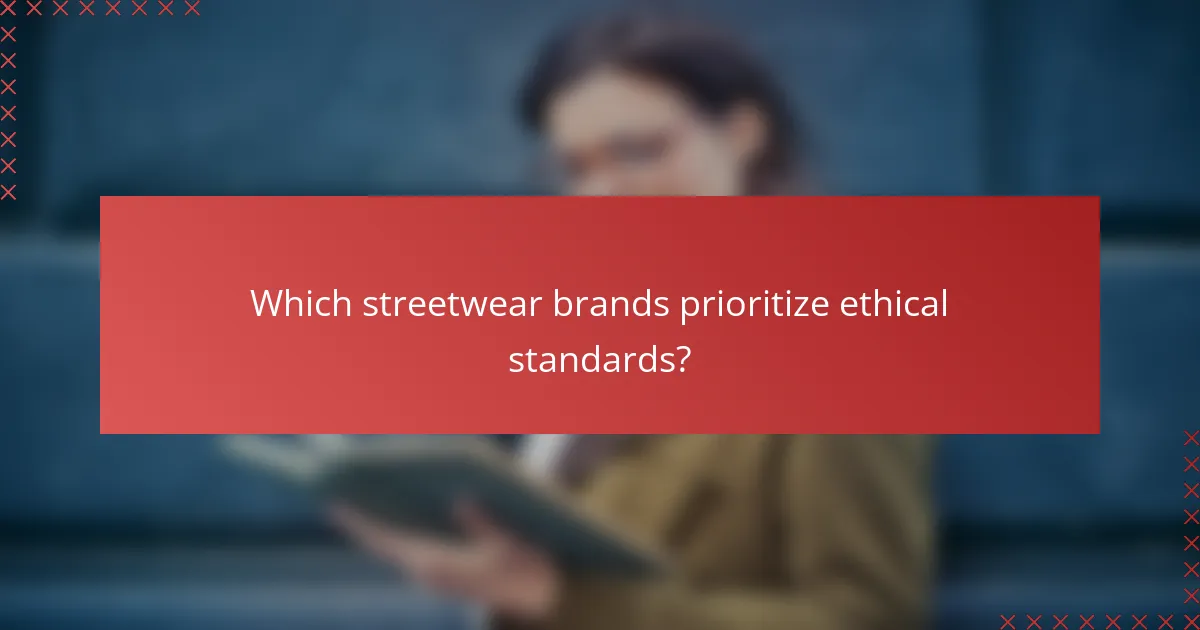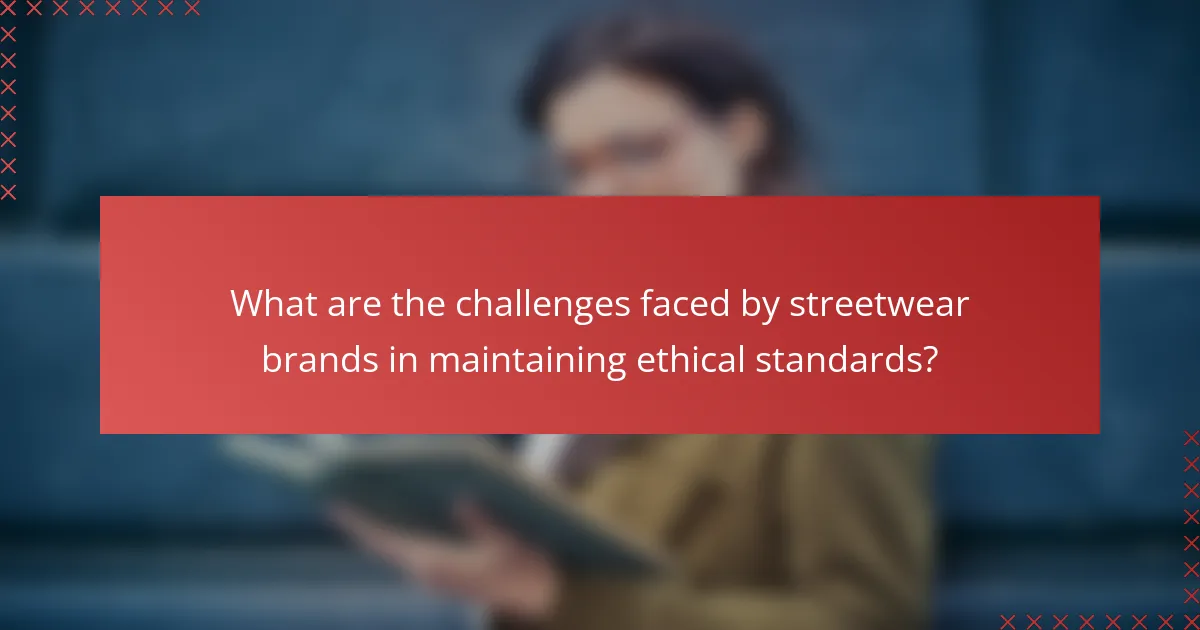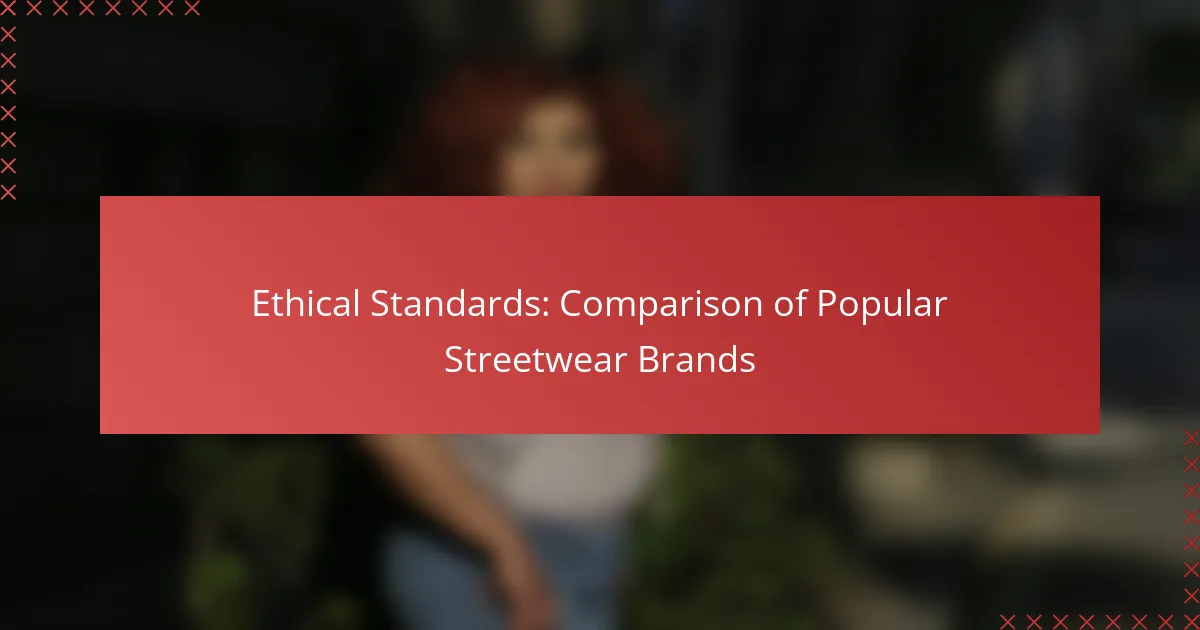In the evolving landscape of fashion, several streetwear brands are stepping up to prioritize ethical standards, emphasizing sustainability and transparency in their operations. As consumers become more conscious of their purchasing decisions, the differences in labor practices and environmental commitments among these brands have become increasingly significant. This focus on ethical production not only reflects a shift in consumer values but also encourages brands to adopt more responsible practices.

Which streetwear brands prioritize ethical standards?
Several streetwear brands are recognized for their commitment to ethical standards, focusing on sustainability, transparency, and eco-friendly practices. These brands not only aim to reduce their environmental impact but also promote fair labor practices and transparency in their supply chains.
Patagonia’s commitment to sustainability
Patagonia is renowned for its strong commitment to sustainability, emphasizing the use of organic materials and fair labor practices. The brand actively encourages customers to repair and recycle their gear, promoting a circular economy.
Additionally, Patagonia donates a portion of its profits to environmental causes, further solidifying its reputation as a leader in ethical fashion. Their initiatives include the “Worn Wear” program, which allows customers to trade in used items for store credit.
Everlane’s transparent pricing model
Everlane stands out with its transparent pricing model, where the company openly shares the true costs behind each product. This includes details on materials, labor, and transportation, allowing consumers to understand how their purchases impact the environment and workers.
By focusing on ethical factories and sustainable materials, Everlane aims to create high-quality products while ensuring fair wages for workers. Their commitment to transparency helps build trust with customers who prioritize ethical consumption.
Adidas’ use of recycled materials
Adidas has made significant strides in sustainability by incorporating recycled materials into its products. The brand’s partnership with Parley for the Oceans has led to the creation of shoes made from ocean plastic, showcasing a commitment to reducing waste.
Adidas aims to use only recycled polyester in its products by a specific target year, reflecting its dedication to minimizing environmental impact. This initiative not only helps reduce plastic waste but also encourages consumers to support sustainable practices in the fashion industry.
Nike’s Move to Zero initiative
Nike’s Move to Zero initiative focuses on achieving zero carbon and zero waste throughout its supply chain. The program includes efforts to reduce energy consumption and utilize sustainable materials in production.
Through innovative design and manufacturing processes, Nike aims to minimize its environmental footprint. The brand also encourages consumers to recycle their old shoes through its Reuse-A-Shoe program, promoting a more sustainable lifecycle for its products.
Reformation’s eco-friendly practices
Reformation is dedicated to eco-friendly practices, using sustainable materials and methods to create stylish clothing. The brand tracks its environmental impact and shares this information with consumers, making it easier for shoppers to make informed choices.
Reformation’s commitment to ethical production includes ensuring fair labor practices and minimizing water usage in its manufacturing processes. This focus on sustainability resonates with environmentally conscious consumers looking for fashionable yet responsible options.

How do ethical standards vary among popular streetwear brands?
Ethical standards among popular streetwear brands can differ significantly, impacting labor practices, environmental sustainability, and supply chain transparency. Consumers increasingly prioritize these factors when choosing brands, leading to a growing emphasis on ethical production methods.
Comparison of labor practices
Labor practices in streetwear brands often vary based on their sourcing strategies and manufacturing locations. Brands that prioritize ethical labor typically ensure fair wages, safe working conditions, and reasonable hours for their workers. For instance, some companies may adhere to Fair Trade standards, while others might not have clear policies in place.
It’s essential to research a brand’s labor practices by looking for certifications or reports that detail their commitments. Brands that are transparent about their labor policies often publish annual sustainability reports or partner with third-party organizations to verify their claims.
Environmental impact assessments
Environmental impact assessments help gauge how streetwear brands affect the planet through their production processes. Brands that take sustainability seriously often conduct regular assessments to evaluate their carbon footprint, water usage, and waste management practices. For example, some companies may utilize organic materials or recycled fabrics to reduce their environmental impact.
When comparing brands, consider their initiatives for reducing waste and emissions. Look for information on their use of sustainable materials and any certifications they may hold, such as Global Organic Textile Standard (GOTS) or OEKO-TEX.
Supply chain transparency levels
Supply chain transparency levels indicate how openly a brand shares information about its sourcing and production processes. Brands committed to ethical standards typically provide detailed insights into their supply chains, including the origins of their materials and the factories involved in production. This transparency helps build consumer trust and accountability.
To assess a brand’s transparency, check if they publish a list of suppliers or provide traceability for their products. Brands that are less transparent may obscure their supply chain details, making it challenging for consumers to understand their ethical practices.

What certifications do leading streetwear brands hold?
Leading streetwear brands often hold various certifications to demonstrate their commitment to ethical standards and sustainability. These certifications help consumers identify brands that prioritize environmental and social responsibility in their production processes.
Global Organic Textile Standard (GOTS)
The Global Organic Textile Standard (GOTS) is a leading textile processing standard for organic fibers. It ensures that textiles are made from at least 70% organic fibers and that the entire supply chain adheres to strict environmental and social criteria.
Brands with GOTS certification must meet requirements for water usage, chemical management, and fair labor practices. This certification is particularly relevant for consumers looking for sustainable and eco-friendly clothing options.
Fair Trade Certified
Fair Trade Certified products guarantee that producers receive fair wages and work under safe conditions. This certification focuses on improving the livelihoods of farmers and workers in developing countries, ensuring they are treated ethically throughout the supply chain.
Brands that carry the Fair Trade Certified label often invest in community development projects, which can include education and health initiatives. Consumers can support ethical practices by choosing products with this certification.
OEKO-TEX certification
OEKO-TEX certification ensures that textiles are free from harmful substances and safe for human use. This certification is particularly important for consumers concerned about the chemical content in their clothing.
Brands with OEKO-TEX certification undergo rigorous testing for harmful chemicals at various stages of production. This certification helps consumers make informed choices about the safety of their apparel, especially for sensitive skin or children’s clothing.

How do consumer preferences influence ethical practices in streetwear?
Consumer preferences significantly shape ethical practices in streetwear by driving brands to adopt more sustainable and responsible methods. As shoppers increasingly prioritize ethical considerations, brands are compelled to align their practices with these values to remain competitive and relevant.
Increased demand for sustainable products
The growing demand for sustainable products has prompted many streetwear brands to incorporate eco-friendly materials and practices. Consumers are now more aware of environmental issues, leading brands to explore organic cotton, recycled fabrics, and low-impact dyes. This shift not only meets consumer expectations but also enhances brand loyalty.
Brands like Patagonia and Reformation have set benchmarks by offering transparent supply chains and sustainable collections. As a result, other streetwear labels are following suit, often highlighting their sustainability efforts in marketing campaigns to attract eco-conscious buyers.
Shift towards ethical consumerism
Ethical consumerism is on the rise, with many shoppers willing to pay a premium for brands that demonstrate social responsibility. This trend encourages streetwear companies to adopt fair labor practices and ensure safe working conditions for their employees. Brands that fail to meet these ethical standards risk losing customers to competitors who prioritize these values.
For instance, brands like Everlane emphasize their commitment to transparency and ethical production, appealing to consumers who value social impact. As ethical consumerism continues to grow, streetwear brands must adapt to these changing preferences to maintain their market position.

What are the challenges faced by streetwear brands in maintaining ethical standards?
Streetwear brands face significant challenges in maintaining ethical standards, primarily due to the tension between profitability and responsible practices. Key issues include balancing cost with sustainability and navigating complex supply chains that often obscure ethical practices.
Balancing cost and sustainability
Streetwear brands often struggle to balance the cost of sustainable materials and practices with consumer expectations for affordable pricing. Sustainable fabrics, such as organic cotton or recycled polyester, can be more expensive than conventional materials, leading brands to make tough decisions about pricing and profit margins.
Brands can adopt strategies like using a mix of sustainable and traditional materials to manage costs while still appealing to eco-conscious consumers. For example, some brands may offer limited lines made from sustainable materials to test market response without fully committing to higher production costs.
Supply chain complexities
The supply chains of streetwear brands are often global and multi-tiered, making it difficult to ensure ethical practices at every level. Brands may rely on numerous suppliers, each with varying labor practices and environmental standards, complicating oversight and accountability.
To address these complexities, brands can implement stricter supplier audits and establish partnerships with organizations that specialize in ethical sourcing. Transparency in the supply chain is crucial; brands should communicate their sourcing practices clearly to consumers, which can enhance trust and brand loyalty.
